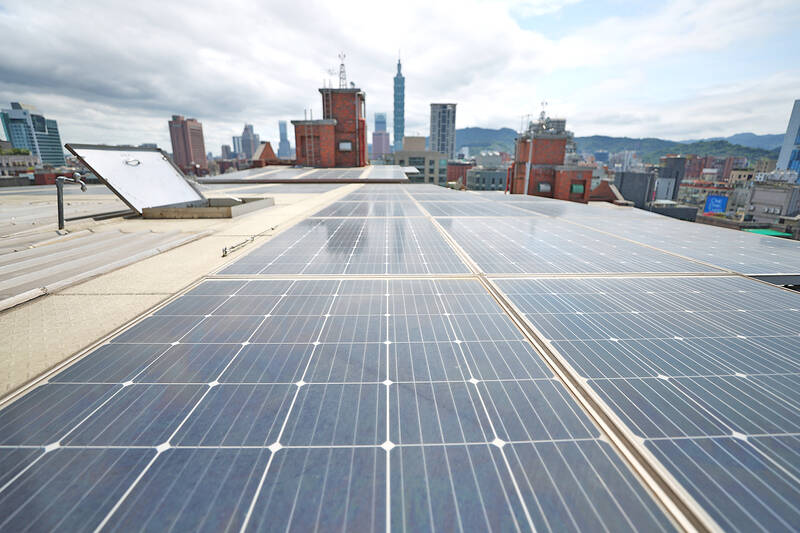The Ministry of Economic Affairs yesterday unveiled new renewable energy feed-in tariffs (FIT) for this year with the steepest cuts of up to 6 percent for solar panel installations, given lower manufacturing costs and better efficiency.
It also came after more than 30 percent of solar energy operators sold the power to private businesses at a higher rate of NT$5 per kilowatt-hour rather than the FIT rates granted by the government, the ministry said.
The ministry said it kept unchanged the FITs for solar systems with capacity smaller than 10kW at NT$5.7055 per kilowatt-hour, with an aim of encouraging households and small businesses to install rooftop solar panels. The tariff for this category is to drop 1.36 percent in the second half of the year, matching the broader downward trend of solar panel FITs.

Photo: CNA
The FITs for other renewable energy installations including onshore and offshore wind farms as well as hydroelectric power plants remain the same as the rates last year, the ministry said.
The ministry also set the FITs for micro hydro generators with capacity of less than 100kW at NT$4.9548 per kilowatt-hour, it added.
Local solar cell manufactures last month called on the ministry to maintain the FITs for solar energy installations, saying many solar cell makers are struggling to turn a profit due to weak domestic demand.
In response, the ministry yesterday said it had thoroughly considered all factors before reaching the final decision.
The FIT for large-scale ground-mount solar panels would see the biggest reduction of 5.91 percent this year to 3.5037 per kilowatt-hour, while floating solar panels came next with a reduction of 5.48 percent to NT$3.8948 per kilowatt-hour.
The tariff for rooftop solar panels with capacity ranging from 100kW to 500kW would fall 5.14 percent to NT$3.7152 per kilowatt-hour, marking the third-largest cut among all categories, the ministry said.
The FIT for marine energy would be flat at NT$7.32 per kilowatt-hour, the highest among all renewable energy, it said, adding that the first marine power plant is set to launch later this year.
The FITs for geothermal, biomass energy and waste-to-energy installations would remain unchanged, ranging from NT$2.8066 to NT$7.32 per kilowatt-hour, the ministry said.

CHIP WAR: Tariffs on Taiwanese chips would prompt companies to move their factories, but not necessarily to the US, unleashing a ‘global cross-sector tariff war’ US President Donald Trump would “shoot himself in the foot” if he follows through on his recent pledge to impose higher tariffs on Taiwanese and other foreign semiconductors entering the US, analysts said. Trump’s plans to raise tariffs on chips manufactured in Taiwan to as high as 100 percent would backfire, macroeconomist Henry Wu (吳嘉隆) said. He would “shoot himself in the foot,” Wu said on Saturday, as such economic measures would lead Taiwanese chip suppliers to pass on additional costs to their US clients and consumers, and ultimately cause another wave of inflation. Trump has claimed that Taiwan took up to

A start-up in Mexico is trying to help get a handle on one coastal city’s plastic waste problem by converting it into gasoline, diesel and other fuels. With less than 10 percent of the world’s plastics being recycled, Petgas’ idea is that rather than letting discarded plastic become waste, it can become productive again as fuel. Petgas developed a machine in the port city of Boca del Rio that uses pyrolysis, a thermodynamic process that heats plastics in the absence of oxygen, breaking it down to produce gasoline, diesel, kerosene, paraffin and coke. Petgas chief technology officer Carlos Parraguirre Diaz said that in

Japan intends to closely monitor the impact on its currency of US President Donald Trump’s new tariffs and is worried about the international fallout from the trade imposts, Japanese Minister of Finance Katsunobu Kato said. “We need to carefully see how the exchange rate and other factors will be affected and what form US monetary policy will take in the future,” Kato said yesterday in an interview with Fuji Television. Japan is very concerned about how the tariffs might impact the global economy, he added. Kato spoke as nations and firms brace for potential repercussions after Trump unleashed the first salvo of

SUPPORT: The government said it would help firms deal with supply disruptions, after Trump signed orders imposing tariffs of 25 percent on imports from Canada and Mexico The government pledged to help companies with operations in Mexico, such as iPhone assembler Hon Hai Precision Industry Co (鴻海精密), also known as Foxconn Technology Group (富士康科技集團), shift production lines and investment if needed to deal with higher US tariffs. The Ministry of Economic Affairs yesterday announced measures to help local firms cope with the US tariff increases on Canada, Mexico, China and other potential areas. The ministry said that it would establish an investment and trade service center in the US to help Taiwanese firms assess the investment environment in different US states, plan supply chain relocation strategies and